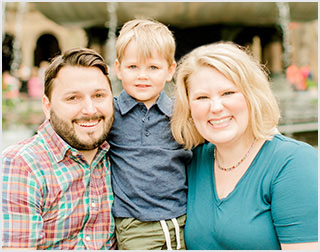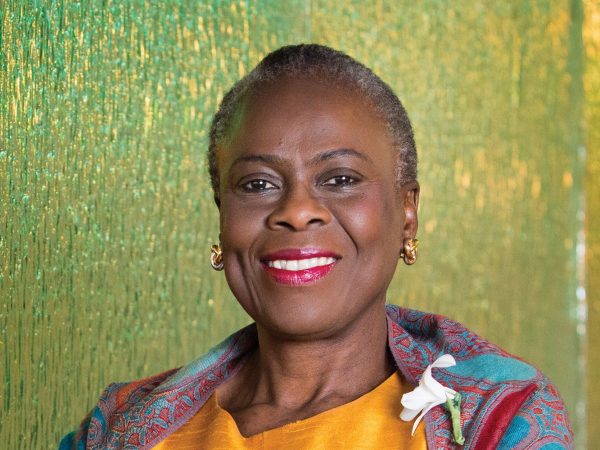Emily Garnett

After a fairly easy pregnancy, my husband and I welcomed our son into our lives. But I began experiencing some significant mid-back pain around eight weeks after he was born.
My son was a big baby and was only calm when I carried him or wore him in a carrier. I was also nursing around the clock, so my husband and I just assumed that the back pain was due to these factors. As my son got older, my back pain got worse, and each doctor I visited said the same things: You’re a new mom, you have a big, active baby, your core is weak, you’re carrying some extra baby weight. I was so frustrated, but also in a lot of pain.
Two years later we had moved out of our tiny New York City apartment and purchased our first home in the suburbs. My back pain was getting worse, but we assumed it was related to the move and chasing after a 2-year-old. I began to accept pain as a part of my life.
But one morning I woke up and it was no longer manageable. I had stabbing pains in my ribs, my back was spasming out of control, and my hips were so painfully stiff that I could barely sit down. I couldn’t sit long enough to drive the car. I knew that something was very wrong.
I immediately called my primary care doctor and booked an appointment. At that point, we had started trying for a second child, so I knew that whatever was going on needed to be addressed before I could have a healthy pregnancy. My doctor listened as I described my symptoms, and then ordered a large panel of blood tests. As she was going through the physical exam, she checked my breasts and quickly found a lump. She said it could be a cyst resulting from breastfeeding, but she wanted me to get it checked out.
I wasn’t sure what to think about this information. I diligently made an appointment for a breast ultrasound, not expecting anything but normal results. My husband and son went with me to the appointment. Less than a week earlier, we had celebrated our fifth wedding anniversary, and our son had turned 2. We talked the whole car ride about all these milestones , and how we hoped to cap off the celebrations with a positive pregnancy test in the next few weeks.
As the ultrasound tech moved the wand around my breast, I mentioned that I hoped that the next time I had an ultrasound, we would get to see a baby. She smiled thinly, and then stopped the exam. “I need to get the radiologist,” she said, and left the room abruptly.
My brain didn’t fully register what was going on, even as the radiologist came back in and explained that she didn’t like the images that were coming up and was sending me immediately for a mammogram. I went out into the waiting room and told my husband to take our little boy out for a walk, that they wanted to do more tests. Neither of us knew how fully our worlds would be rocked, how much our relationship would be tested, or how we were about to undergo one of the most frightening experiences of our lives.
After the mammogram, the tech led me to the radiologist’s office, and offered to get my husband to be with me. I sat in the chair as the radiologist started to speak with words that I couldn’t understand: irregular, calcifications, spiculated mass. Finally, I clawed my way out of my fog of denial and misunderstanding and said, “I still don’t understand – do I have breast cancer?”
Yes, she said. It’s breast cancer.
The rest of the day went by in a horrible blur, and that horrible blur became my new normal as I broke the news to family and friends.
Although we hadn’t realized it yet, the worst news was still to come.
At the urging of my primary care doctor and several family friends, I sought a second opinion at a large, nationally ranked cancer center. At the time of my diagnosis, the radiologist, oncologist, and breast surgeon reassured me that my cancer remained localized, that I would be “fine.” However, when my husband and I met with the new oncologist, she reviewed my pathology and scans and saw a different story. She was concerned with some spots showing up on my sternum and immediately sent me for a more thorough scan. After the scan, she called almost immediately with the results: The spots had lit up significantly, indicating that my cancer was not localized to my breast, but had spread – metastasized – through my lymph nodes, and had invaded my bones as well. My diagnosis was now stage IV breast cancer. The five-year survival rate for metastatic breast cancer hovers around 25-30 percent.
I don’t have to tell you how devastating this diagnosis has been. Shortly after these results came through, I started hormone therapy – my type of breast cancer is driven by estrogen, so the best way to treat it is to remove all estrogen from my body. I was put into chemical menopause, and later, underwent a total hysterectomy, rendering me completely infertile. We can never have another child – we were unable to do any fertility preservation, are not currently eligible to adopt, and are choosing to focus our energy on the child we have, who is the light of our lives.
My first line of therapy did not include any breast surgery or chemotherapy, but a new type of targeted therapy – two pills a day. While this allowed me to avoid the hair loss, infusions, and other challenges that come with traditional chemo, my therapy caused a tremendous amount of joint pain, aches, and weight gain. At only 32, I found myself living in the body of a much older woman.
The first line of treatment was effective for almost a year, but in December 2018, we discovered that it was no longer working. I elected to switch courses of treatment and enroll in a clinical trial, testing a drug that has not even come onto the market yet. I am only a few weeks in, but so far, my side effects have been minimal. At my next set of scans I will know by then whether the clinical trial drug is effective.
I have chosen to be very outspoken about my diagnosis, my treatment, and all aspects of life with cancer, because I want those dealing with similar situations to know that they are not alone. I began a blog, called Beyond the Pink Ribbon, which provides education about breast cancer and advocates for better funding and awareness for metastatic breast cancer, particularly in younger women.
I also started a podcast, “The Intersection of Cancer and Life,” that discusses many sensitive issues surrounding life with cancer. Lastly, I am starting a nonprofit to help families with young children in which a parent was diagnosed with metastatic cancer. As an elder-law attorney by training, I have found that so many of my skills can be useful in this arena. Every day, I try to use my experience to create some good from this horrible diagnosis.
For those of you who are dealing with a cancer diagnosis, or a similarly tumultuous health challenge, I am not going to tell you that it will be OK, or things will get better. What I can say is that you are not alone. You are resilient and, most importantly, you are still here, now.
Eventually you will start to process and live in your new normal. You will grieve your losses. You have lost something significant, and it is heartbreaking.
The thing that has given me the most hope, the most fortitude, is that I refuse to let my mind live in the future, because I do not know what that is. I only know what is true at this moment: I am here, I am alive, and, despite my limitations, I am still capable of living a life that I value, however I choose to define it.




